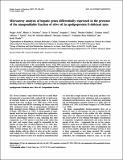Por favor, use este identificador para citar o enlazar a este item:
http://hdl.handle.net/10261/53583COMPARTIR / EXPORTAR:
 SHARE SHARE
 CORE
BASE CORE
BASE
|
|
| Visualizar otros formatos: MARC | Dublin Core | RDF | ORE | MODS | METS | DIDL | DATACITE | |

| Título: | Microarray analysis of hepatic genes differentially expressed in the presence of the unsaponifiable fraction of olive oil in apolipoprotein E-deficient mice |
Autor: | Acín, Sergio; Navarro, María Ángeles; Perona, Javier S. CSIC ORCID ; Surra, Joaquín C.; Guillén, Natalia; Arnal, Carmen CSIC; Sarría, Alfonso J.; Arbonés-Mainar, José M.; Camicer, Ricardo; Ruiz-Gutiérrez, Valentina CSIC ; Osada, Jesús | Palabras clave: | Apolipoprotein E-deficient mice Olive oil Unsaponifiable fraction |
Fecha de publicación: | abr-2007 | Editor: | Cambridge University Press | Citación: | British Journal of Nutrition 97(4): 628-638 (2007) | Resumen: | The hypothesis that the unsaponifiable fraction of olive oil dramatically influences hepatic gene expression was tested in mice. Two olive oils, obtained from the same olive cultivar but by different technological procedures, were characterized to show that they differed mainly in terms of the composition/quantity of this unsaponifiable fraction. Using DNA microarrays, hepatic gene expression was analysed in apoE-deficient mice fed one of two isoenergetic, isonitrogenous diets containing either 10% (w/w) olive oil or unsaponifiable fraction-enriched olive oil. To provide an initial screening of potential candidate genes involved in a differential response, only genes with remarkably modified expression (signal log2 ratio ≥3 or < -3) were further considered. The eleven genes fulfilling these prerequisites were confirmed by quantitative RT-PCR, and then analysed in apoE-deficient mice with a C57BL/6J genetic background. Orosomucoid and serum amyloid A2 were upregulated (to variable extents depending on the genetic background) in the absence of hepatic steatosis and inflammation. Fabp5 and Mt2 were also strongly upregulated. Several proteases were highly suppressed by the unsaponifiable-enriched olive diet, independent of the genetic background. The findings indicate that change in the expression of these genes is a good marker of the intake of the unsaponifiable fraction of olive oil. The results highlight the important biological effects of the unsaponifiable fraction of olive oil. The term 'monounsaturated fatty acid-enriched oil' no longer appears appropriate for describing all the oils to which it is currently applied since it does not adequately reflect that they have different biological effects. © The Authors 2007. | URI: | http://hdl.handle.net/10261/53583 | DOI: | 10.1017/S0007114507657912 | Identificadores: | doi: 10.1017/S0007114507657912 issn: 0007-1145 e-issn: 1475-2662 |
| Aparece en las colecciones: | (IG) Artículos |
Ficheros en este ítem:
| Fichero | Descripción | Tamaño | Formato | |
|---|---|---|---|---|
| E-deficient.pdf | 157,8 kB | Adobe PDF |  Visualizar/Abrir |
CORE Recommender
SCOPUSTM
Citations
31
checked on 05-may-2024
WEB OF SCIENCETM
Citations
29
checked on 29-feb-2024
Page view(s)
316
checked on 09-may-2024
Download(s)
285
checked on 09-may-2024
Google ScholarTM
Check
Altmetric
Altmetric
NOTA: Los ítems de Digital.CSIC están protegidos por copyright, con todos los derechos reservados, a menos que se indique lo contrario.
